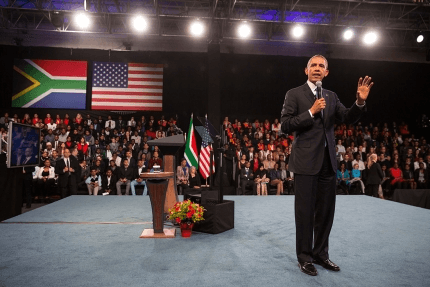In front of 500 exceptional young leaders, President Obama will announce the renaming of the Washington Fellowship for Young African Leaders in honor of Nelson Mandela. He will also announce that the United States intends to double the number of annual participants in the Mandela Washington Fellowship to 1000 by the summer of 2016.
The Mandela Washington Fellowship is the flagship program of the President’s Young African Leaders Initiative (YALI) andembodies President Obama’s commitment to invest in the future of Africa. The first class of Mandela Washington Fellows arrived in June 2014 for six weeks of intensive executive leadership training, networking, and skills building, followed by a Presidential Summit in Washington, DC. Through this initiative, young African leaders are gaining the skills and connections they need to accelerate their own career trajectories and contribute more robustly to strengthening democratic institutions, spurring economic growth, and enhancing peace and security in Africa
Welcoming Promising Leaders to the United States
The Mandela Washington Fellows arrived in the United States in June 2014 and studied at 20 top American universities. Their six-week academic coursework and executive leadership training focused on one of three tracks: business and entrepreneurship, civic leadership, or public management. Formal university programming was augmented with workshops, mentoring, and networking opportunities with leaders in their fields.
Today, Mandela Washington Fellows will converge in Washington, DC for a Presidential Summit and Town Hall. Over the next three days, Fellows will continue to engage with leaders from the public and private sectors, as well as with each other. Following the Summit, 100 Fellows will stay in the United States to participate in eight-week internships with over 80 American non-governmental organizations (NGOs), private companies, and governmental offices.
Investing in Opportunities on the Continent
The U.S. Government is working with businesses, governments, and NGOs to create ongoing professional opportunities andresources to support these young leaders when they return home.
Professional Development: The U.S. Government is securing over 200 internships and professional placements for Mandela Washington Fellows in private companies, government ministries, research institutes, multilateral organizations, and non-profit or community-based organizations on the continent. Fellows will be placed in internships in private sector companies such as Microsoft and global NGOs, such as Partners for Democratic Change.
Mentoring: Fellows will be matched with mentors – industry leaders from the public, private, and non-profit sectors, including from major international companies and U.S. organizations with operations in Africa – who will guide and support Fellows as they seek to apply the lessons and skills gained through their fellowship experience, plan short and long-term career goals, and grow professionally after their return to Africa.
Seed Funding: Mandela Washington Fellows will have access to dedicated funding to support their ideas, businesses, and organizations and undertake joint projects to improve their communities. More than $5 million in small grants will be awarded in the first three years by the U.S. African Development Foundation for Mandela Washington Fellows seeking to start or enhance their businesses or social enterprises. In addition, Washington Fellows will be able to attract funding for their venturesand projects through RocketHub’s dedicated YALI crowdfunding platform.
Contributing to the Community: The State Department will invest an additional $5 million over the next three years to help Fellows establish or grow their own NGOs, undertake projects to improve their communities, or work collaboratively to build the network of young African leaders, including in underserved areas. Fellows will serve as mentors to other young Africans in eight Connect Camps, where they will use technology to promote social good and community engagement.
Leveraging Ongoing U.S. Government Investments: USAID will leverage more than $350 million in existing youth programs and development initiatives to give the Fellows access to a broad array of assistance and support. For instance, under the Feed the Future Initiative, Fellows in selected countries will benefit from training programs and tailored internships.
Sustaining a Strong Network
U.S. embassies will provide resources and support to ensure that Mandela Washington Fellows stay connected through in-country alumni associations and community service activities. Fellows will have access to virtual exchange toolkits (customized for a wide range of bandwidth environments) in order to maintain strong connections back to the United States and extend their experience to other young Africans. Finally, the U.S. Government will organize regular local and regional events and networkingopportunities to sustain deep ties with these dynamic Fellows over the years to come.
Host Institutions:
- Clark-Atlanta University
- Dartmouth College
- Northwestern University
- University of Notre Dame
- University of Texas at Austin
- University of Wisconsin – Stout
- Yale University
- Arizona State University
- Rutgers, The State University of New Jersey
- Tulane University
- University of California, Berkeley
- University of Delaware
- University of Virginia/The College of William and Mary
- Wagner College
- Florida International University
- Howard University
- Morgan State University
- Syracuse University
- University of Arkansas
- University of Minnesota
